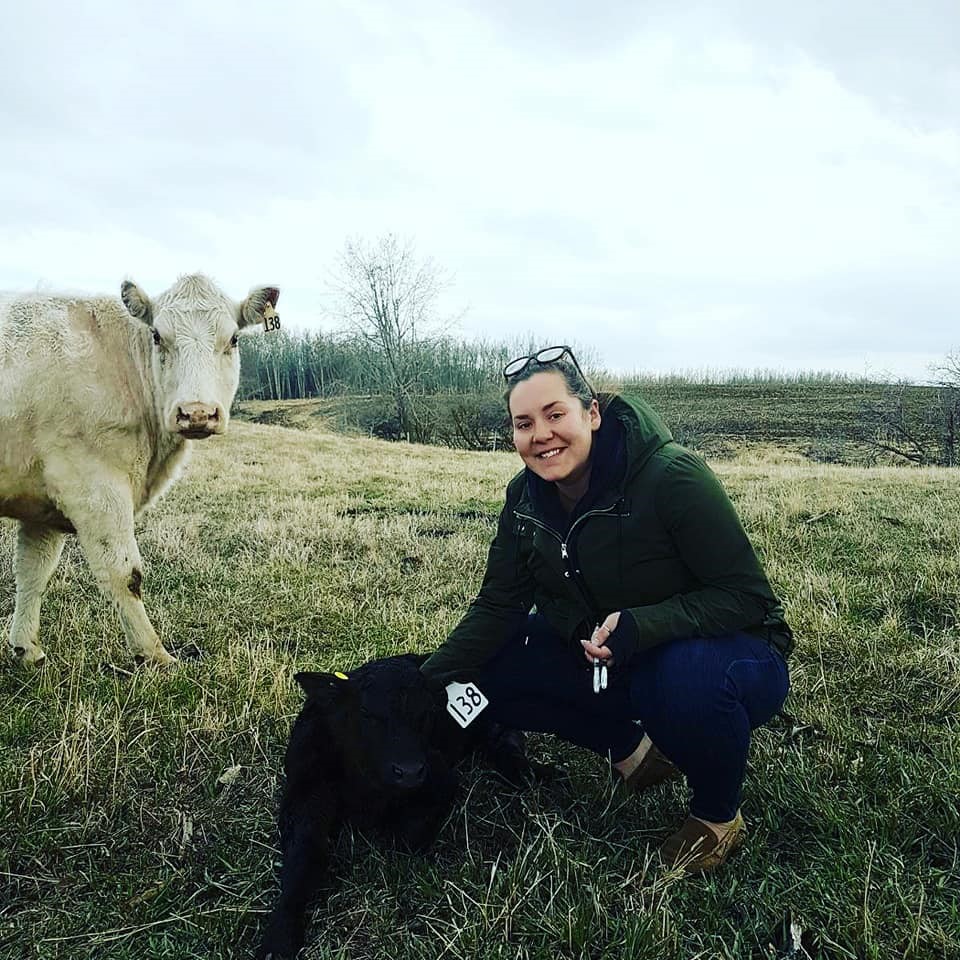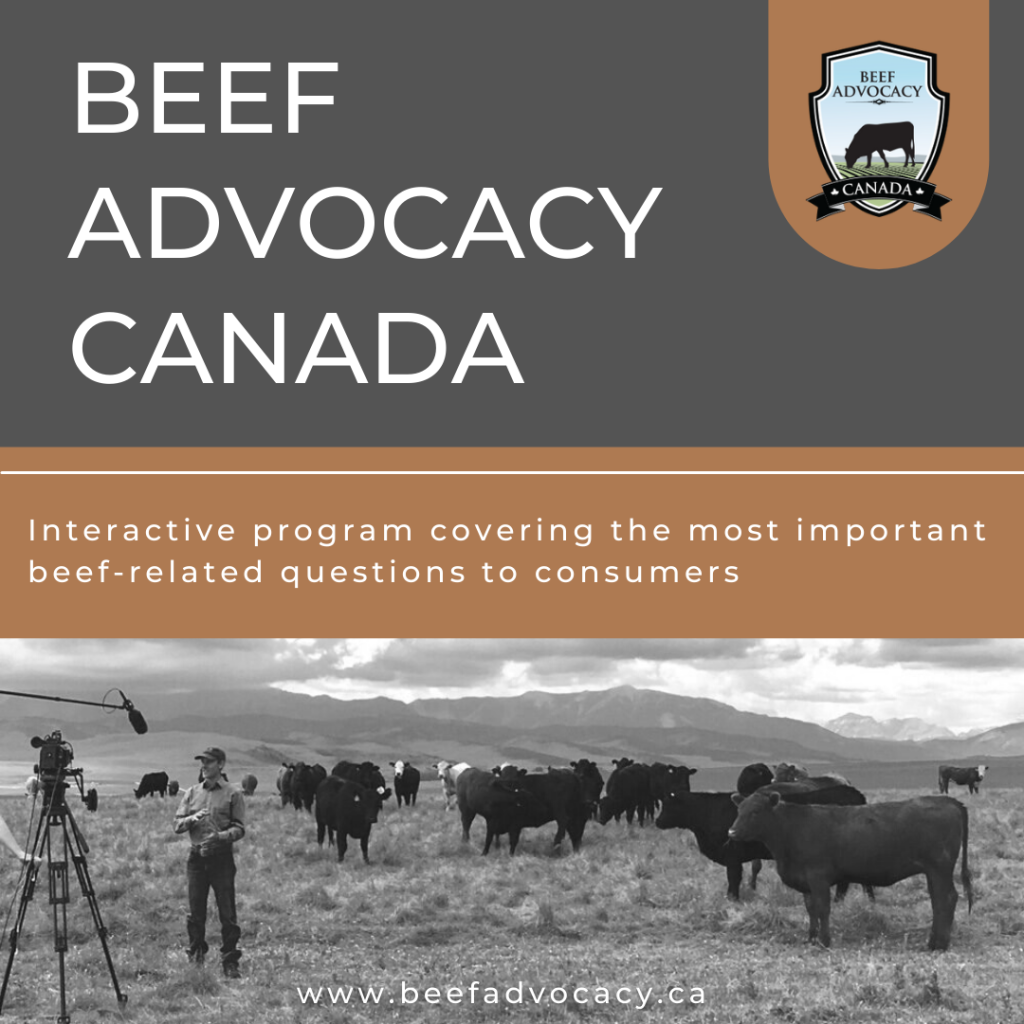AB Direct - Steers
Rail: ---
AB Direct - Heifers
Rail: ---
US Trade- Steers
Rail: 290.00 (IA)
US Trade - Heifers
Rail: 290.00 (IA)
Canadian Dollar
0.02
Getting the right message to consumers with online beef advocacy course
Nikki Olson is confident talking about cattle and their benefits with other cattle producers, but the farm-raised agronomist was unsure about the best way to talk about livestock to city folks.

To ensure she had the best messages and tools to talk to consumers, Olson enrolled in the Beef Advocacy Canada program, a three-hour, online learning program that helps empower producers to become beef advocates.
“We can all talk to [our peers] really well, but we have struggled to reach those outside our typical network,” says Olson.
“I thought taking the Beef Advocacy course would make me feel more confident to tell our farm story on social media. It gives me a better and more confident conversation with outside users and individuals when they have questions.”
With two small children at home, Olson stepped back from her agronomy business, took a more active role on the family’s beef farm, and started a company focused on sewing children’s clothing. It is through the sewing company she realized many of her customers were eager to learn more about agriculture.
She noticed whenever she posted farm photos on her Willow and Wheat sewing Facebook and Instagram accounts, the mostly city-based customers wanted to know more about the farm. Some wanted to buy farm-raised meats, another wanted to take her son on a combine ride, and another wanted to know about the livestock medication used on the farm.

With Olson’s newfound knowledge from the Beef Advocacy Canada course, she talked about the importance of medicine for animals, withdrawal times, animal welfare and codes of practice.
“To be able to confidently respond and say we only give medications when necessary, made me feel good,” says Olson. “I have always been outspoken and enjoyed public speaking, but I wanted to feel a bit more confident with my engagement with people who aren’t in the industry.”
It’s just these kinds of connections and discussion the Beef Advocacy Canada online course was designed for, says Lynsay Beavers, Stakeholder Engagement Specialist with the Canadian Cattlemen’s Association, who redesigned the course from an earlier version.

“The great news is consumer research has shown that when consumers are exposed to positive messages about Canadian beef production, increases in knowledge and awareness translate into more positive perceptions,” says Beavers.
The online course uses videos, short quizzes, drag and drop and matching segments, infographics and photos to teach the most important beef-related questions from consumers and the best responses on how beef producers can become beef advocates.
“It is an interactive platform that promotes a good experience for people to do at their own pace,” says Beavers, who wanted to ensure an enjoyable and educational experience with the redesigned website.
Olson worked her way through the program in the evening when her children were in bed.
“Webinars can be so dry,” says Olson. “As a mom with very little sleep, I had no issues staying awake, staying engaged, listening to it, answering the questions. It kept everything upbeat and interesting,” adds Olson, a finalist in the Cattlemen’s Young Leaders Mentorship Program. The online course is mandatory for all CYL candidates and recommended for other beef organizations.
The course isn’t limited to people familiar with the beef industry. Beaver says the course has excellent information for college and university students, VBP+ members or anyone wanting to increase their knowledge of the beef industry. Some food service companies have encouraged their staff to take the course to be able to answer questions from restaurant owners and their staff.
The Beef Advocacy Canada program consists of five courses and corresponding lessons: The Canadian Beef Community, Production Practices and Animal Welfare, Beef and the Environment, All About the Beef on Your Plate, and Beef Advocacy.
People aren’t sure about where to turn to for credible information about food and farming. Studies have shown, consumers trust farmers, ranchers and others in the beef industry. The course helps those trusted sources have the tools to talk to the consumers.
This article was first published in Volume 2 Issue 2 of ABP Magazine (April 2022). Watch for more digital content from the magazine on ABP Daily.
Leave a Comment
Add abpdaily.com to your home screen
Tap the menu button next to the address bar or at the bottom of your browser.
Select ‘Install’ or ‘Add to Homescreen’ to stay connected.




Share this article on
About the Author
Mary MacArthur has spent her life in agriculture talking to farmers around the world. When Mary isn't writing about agriculture, or taking photos, she spends her time running and hiking.